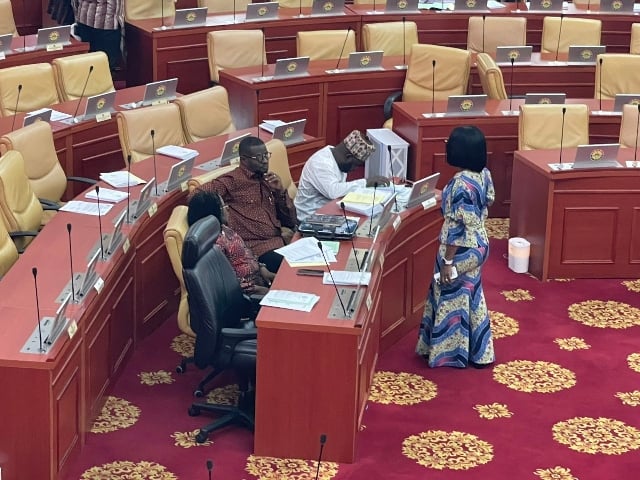The political landscape in Ghana witnessed a dramatic turn of events as members of the Minority in Parliament, after staging a walkout and declaring a boycott of parliamentary proceedings, made an unexpected return to the House on Friday, May 30, 2025. Their initial withdrawal was a demonstration of solidarity with New Patriotic Party (NPP) Ashanti Regional Chairman, Bernard Antwi Boasiako, widely known as Chairman Wontumi, who was detained by the Economic and Organised Crime Office (EOCO) on allegations of fraud, money laundering, and causing financial loss to the state. The Minority’s dramatic exit underscored the escalating tension between the ruling party and the opposition, with the arrest of a prominent figure like Chairman Wontumi being perceived as a politically motivated maneuver.
Just a day prior to their return, the Minority MPs had staged a protest at the EOCO headquarters, raising concerns about what they deemed as excessive and politically motivated bail conditions imposed on Chairman Wontumi. The GH¢50 million bail amount, they argued, was a deliberate attempt to cripple Wontumi and by extension, the NPP. This protest symbolized their strong disapproval of the perceived targeting of key NPP figures, particularly those with influence in the party’s stronghold regions, further deepening the political divide and raising questions about the impartiality of law enforcement agencies.
The Minority’s sudden reappearance in Parliament, a day after their vocal demonstration, signaled a potential shift in strategy. Akuapem North MP Sammy Awuku confirmed their return, adding an air of anticipation by hinting at potential actions during the Friday session. This unexpected move ignited speculation and left observers wondering whether they would continue their disruptive tactics within the parliamentary chambers, or perhaps adopt a more conciliatory approach to address their grievances. The situation had become a delicate balancing act between expressing dissent and upholding the democratic process.
The backdrop of this parliamentary drama is the ongoing investigation by EOCO, which claims to have uncovered serious criminal activities involving both local and international elements. The Deputy Attorney-General defended the charges against Chairman Wontumi, asserting that the case was not politically motivated but rather rooted in a genuine pursuit of justice. This divergence in narratives—the opposition crying foul play and the government maintaining the integrity of the investigation—further fueled public discourse and heightened the political stakes.
The Minority’s decision to return to Parliament, despite their strong reservations about the Wontumi case, suggests a possible recalibration of their approach. While their initial walkout served as a powerful expression of protest and solidarity, their return hinted at a potential willingness to engage within the parliamentary framework, possibly to raise their concerns through formal channels and seek accountability. This shift could indicate a move towards dialogue and negotiation, although the potential for further disruptions and protests remained, depending on the developments within the Wontumi case and the government’s response to their concerns.
The unfolding events surrounding Chairman Wontumi’s detention have brought to the forefront critical issues of justice, due process, and the potential for political manipulation within Ghana’s legal system. The Minority’s actions, from their initial walkout to their subsequent return, reflect the delicate tightrope they walk between upholding democratic principles and fighting for what they perceive as political persecution. The situation continues to be fluid, with the potential for further escalation depending on the actions of both the Minority and the government in the days and weeks to come. As observers watch closely, the case of Chairman Wontumi has become a touchstone for the broader political dynamics at play in Ghana, raising fundamental questions about the independence of institutions and the balance of power within the nation’s democratic framework.


